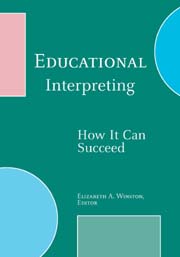How It Can Succeed
Elizabeth A. Winston, Editor
|
View the table of contents. View the list of contributors. Read an excerpt. Read reviews: The Midwest Book Review, The Sign Language Translator and Interpreter. |
$80.00s print edition $80.00 e-book |
This text has been replaced by Advances in Educational Interpreting.
From The Sign Language Translator and Interpreter
Published in 2004. Winston’s volume remains a seminal text in the relatively barren landscape of educational interpreting research today. Despite the rapid shift in emphasis towards an interpreted education in mainstream settings for deaf children, and burgeoning employment opportunities for educational interpreters in countries such as the US, the UK and Australia, single volumes like Winston’s on this widespread practice are rare.
Contentious topics, such as the role of the educational interpreter, the efficacy of interpreters in school settings and the accessibility of an interpreted education, have been addressed in recent years in a growing body of journal articles and chapters in interpreting texts (e.g. Harrington 2001, Potter and Leigh 2002, Napier and Barker 2004, Marschark ct al. 2005). These themes are drawn upon and extended in Winston’s collection of articles. Until Winston’s book appeared, Seal (1998) had published the only other single volume on educational interpreting in the field, offering an overview of ‘best practice’ in educational interpreting and an easy to read reference guide for educational interpreters.
In her edited volume, Winston challenges the field by openly criticizing the practice of educational interpreting, providing a range of empirical evidence to support her case. Winston’s text is therefore quite different in nature and format to Seal’s. In her introduction she does not hesitate to position herself personally on the issue of educational interpreting. Using emotive and powerful language, Winston notes her despair at the lack of respect demonstrated towards the linguistic needs of deaf students, and she admonishes those who “abuse deaf children in the name of education” (p. 2) by exhorting an interpreted education based on no empirical evidence of its efficacy. The passionate concerns expressed by Winston are echoed by all of the contributors to the volume, all either students who have experienced an interpreted education themselves, practicing interpreters, researchers and, or educators.
The volume is comprised of three parts, in addition to an initial introduction by Winston. Each part of the hook centres on a different perspective, i.e. Deaf students (part one, containing 4 chapters) Interpreting and interpreters (part two, 3 chapters) and Improving an interpreted education (part three, 4 chapters).
The first chapter by Kim Brown Kurz and Elizabeth Caldwell Langer reports on qualitative interview data collected from twenty deaf and hard of hearing students who access education through interpretation. An interesting chapter unfolds, covering students’ views of the roles and responsibilities of educational interpreters and their learning through interpreters in group discussions, lectures and class participation. It further addresses interaction with peers through interpretation and the students’ comprehension of interpreters, ending with an extensive ‘wish list’ for interpreters, mainstream teachers and interpreter coordinators. The longest chapter in the volume, it provides an important insight into the perspective of the student. The authors note that educational interpreting experiences are unique and that the issues raised in the chapter should be considered as food for thought to prompt further discussion amongst educators, administrators, parents, students and interpreters.
Elizabeth A. Winston is the director of the Teaching Interpreting Educators and Mentors (TIEM) Center in Loveland, CO, where she directs research into interpreter education practices, discourse analysis, assessment, and evaluation.
Print Edition: ISBN 978-1-56368-309-1, 7 x 10 casebound, 240 pages, 13 tables, 8 figures
$80.00s
E-Book: ISBN 978-1-56368-281-0
$80.00
